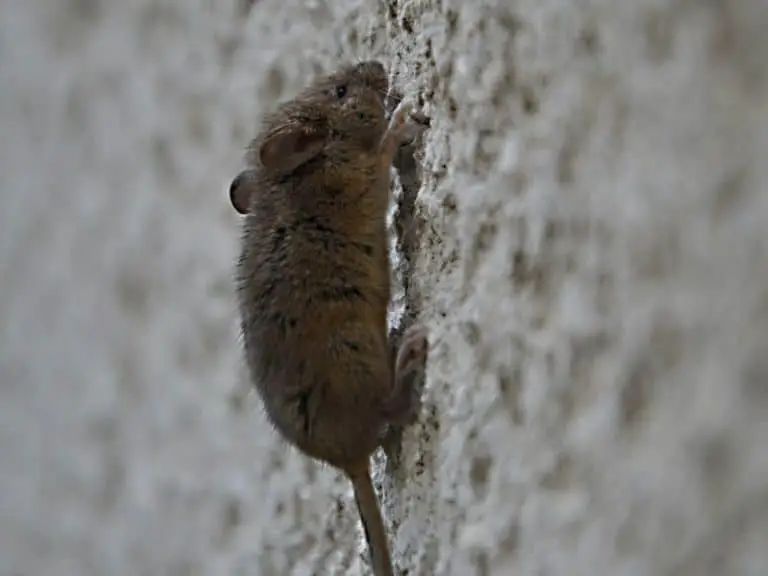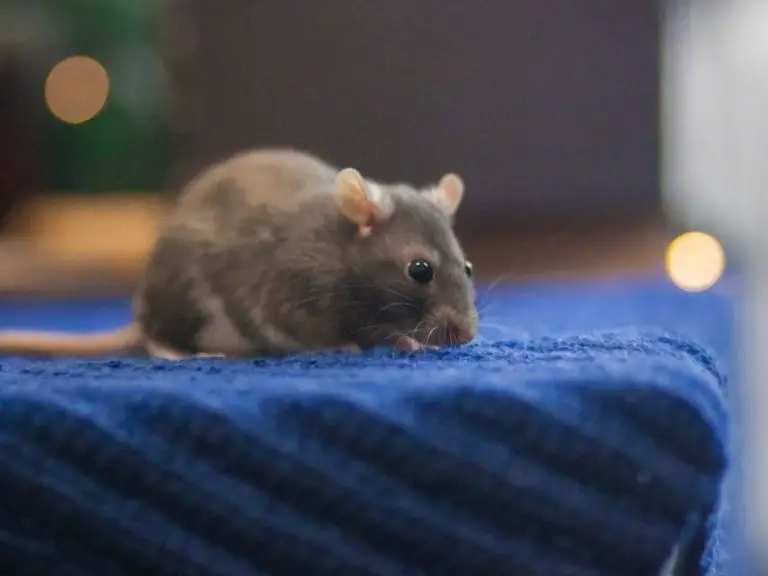Do Rats Attack Humans or Pets: Things You Have to Know
Many people wonder if rats attack humans or pets for one reason or another. In a normal situation, rats will do everything they can to get away safely from large creatures like humans or dogs, and they are usually afraid of us, unless they are the domesticated kind. If they cannot escape or if they have other motivations, will rats, cornered or not, attack humans and pets?
Sometimes rats do attack humans or pets. Cornered and captured wild rats bite and scratch. They have also been known to bite babies, the homeless, the bedridden, and sleeping people. Keeping wild rats as pets or attempting to catch them will also provoke an attack.
Usually, rats will stay away from us and our large dogs or cats, especially cats, which are their natural enemies.
But there have been documented accounts of rats attacking humans and pets, and it is incumbent upon you to know the reasons for these incidences, in order that you can implement preventive measures to avoid such incidents from happening to you and your household.
Rat Attacks Are Rare
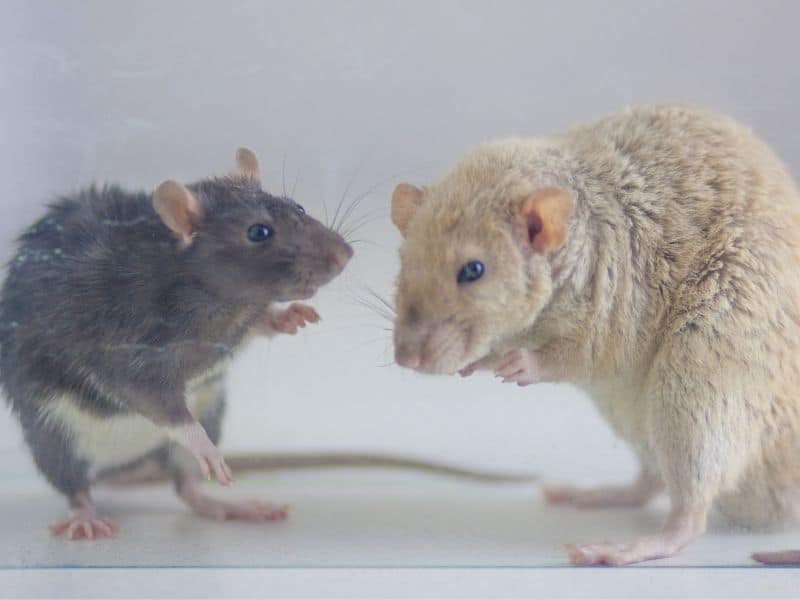
Wild rats that cannot escape or are cornered by a human will sometimes not hesitate to mount an attack to ensure its survival.
For instance, black rats are capable of making a jump as high as 70 cm to pounce on you; it is worse if it lands on your face.
They can also climb walls, and they are ever captured, they can and do squeal, bite, and scratch. An attack by a wild rat is something you would never wish upon yourself.
These creatures can transmit diseases that are highly infectious and deadly to humans. Their bite can infect you with several viruses that are very pathogenic and transmissible.
Nonetheless, rats in general do not bite.
They are not inclined to do so.
Rats attacking humans cases do exist nonetheless, and there have been reports where rats have bitten babies, sick and bedridden people, the homeless, and even healthy sleeping people.
Rats are usually nocturnal, and they always make it a point to avoid people as much as they can.
When Rats Attack People
If attacks are rare, what are the circumstances when they happen? What causes rats to attack people?
Do rats hide from humans?
In general, rats are much more scared of people, because, for them, humans are literal giants that can easily kill them. Even if it is rare, they do attack people due to several reasons.
Wild rats are kept as pets
It may seem unusual for some people to know that there are people who keep wild rats in captivity.
And while domesticated white laboratory rats sometimes bite humans, especially when they are handled roughly, captive wild rats are more likely to bite.
Keeping a wild rat as a pet can have negative consequences; they are not as tamed or amenable to human presence and handling compared to domesticated white rats, which are selectively bred specifically to be docile.
The rat is cornered
Most wildlife species defend themselves when they feel cornered and have nowhere to run to.
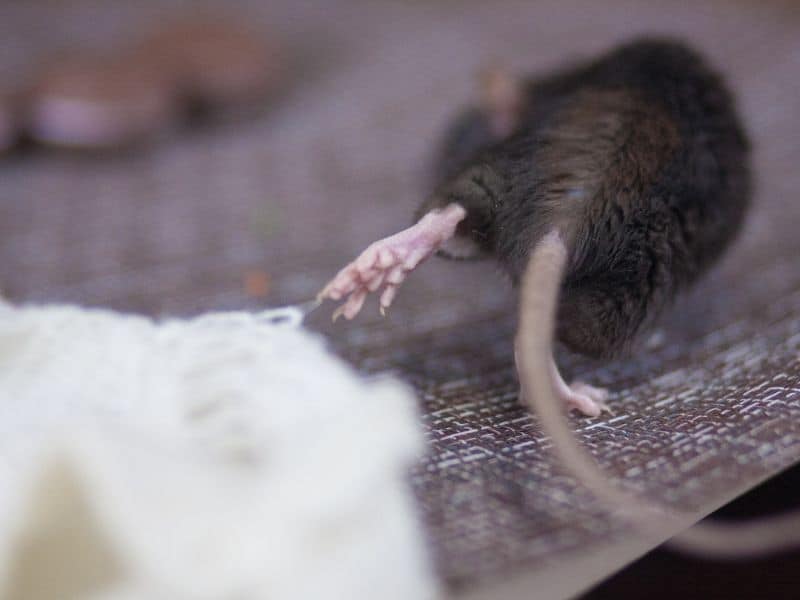
As wild animals, rats may also attack you as part of their survival instinct when they are trapped or cornered.
To avoid such an incident, try to avoid putting rats in such a position. It is only normal for them to bite because they are fighting for their survival.
They see you as a threat who is out to harm or kill them; thus, it is only natural for them to fight back.
You are attempting to catch them
Trying to catch a rat, if you are not careful, may result in a bite as the rat tries to fight for its life.
There are many ways of catching rats without having to handle them and put yourself at risk.
You are asleep
On some occasions, people have reported rats attacking them while they are asleep.
While some consider this an urban legend, a friend of mine experienced it first hand. He was bitten on the toes by a rat as he slept.
This particular incident may have something to do with the fact that my friend’s house had a severe rat infestation.
The rats living in the house may have become too comfortable in the place so that they became brave enough to bite a sleeping person.
There are cases when the rats bit sleeping people because they went to sleep having food residues on their hands or face. The rats then proceeded to lick these bits of food, which eventually led to an unprovoked bite.
This is the same reason why rats sometimes bite babies. As babies sleep, it is not unusual for them to vomit or drool; these food particles attract rats.
Do mice bite humans in their sleep?
The circumstances and factors where mice might bite humans while sleeping may be similar to those of rats.
The rat nest is disturbed
If a rat’s nest is disturbed, it is only normal for them to defend their abode, especially if the nest has offspring in it.
We may be able to relate to the rat’s behavior if we consider a scenario where a stranger attacks our children. we would then naturally seek to protect our children by fighting back.
When Rats Attack Your Pets
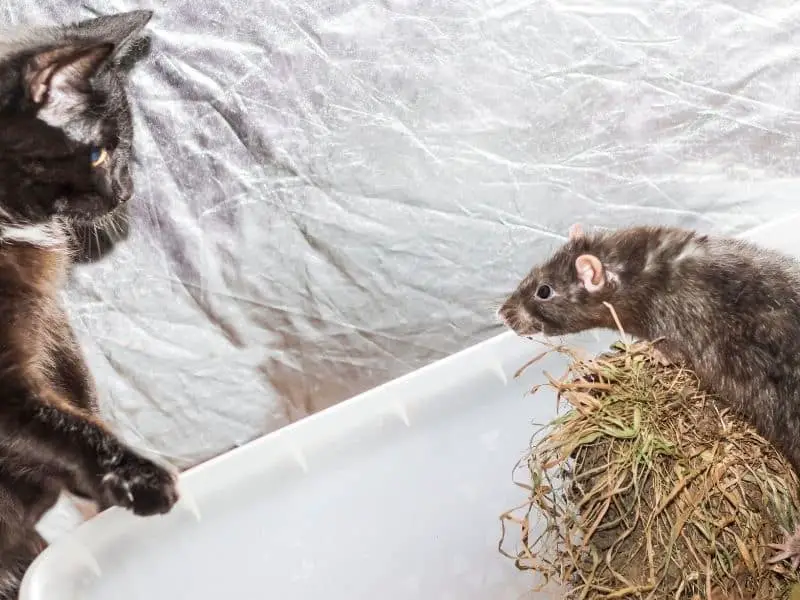
Many people, especially farmers, have taken care of dogs and cats specifically to ward off or prevent infestations or rats, mice, and other rodents. Dogs and cats can be considered the rat’s natural enemy.
Farmers employ dogs and cats against rats because the latter eat grain and destroy crops. They also nest in hays and present various problems to livestock and pets.
But will rats attack dogs and other pets?
While rats do run away from dogs and cats, they are not necessarily afraid of them. It is a rat’s nature to run from larger animals when they see these large creatures going their way.
Nevertheless, this does not necessarily mean they are afraid of or are timid towards larger animals. This is especially true when compared to the reaction of mice, which are less confrontational probably due to their smaller size.
Rats can also fight fiercely when they are cornered by dogs and cats. They can leap at and bite your pet.
The bite inflicted by rats and even their scratches can transmit many major and serious diseases.
It is the saliva that delivers these disease-causing organisms; the rat’s bite and scratches can transmit pathogenic organisms into the victim’s bite wound.
Scratches from rats are equally dangerous due to the fact that rats usually lick their paws often, so that whatever infectious organisms are present in their saliva can be transferred to their paws.
You should always ensure that your dog and cat are updated in their vaccination program; otherwise, they may fall victim to disease if they are ever infected by rats, from bites, scratches, or exposure to rat urine and droppings.
Effects Of Rat Bites On You And Your Pets
The general symptoms you may observe from a rat bite includes swelling, pain, and redness around the bitten area. If the wound gets infected, it may include a pus-filled and weeping wound.
It is very dangerous for a rat to bite or scratch you or your pet due to the seriousness of infections that it can transmit. Therefore, in the event of a rat bite, immediately seek the help of a doctor.
Many times, these diseases do not even need the actual physical contact of a rat to be transmitted to you.
They can be transmitted through the ingestion of water or food contaminated by rat excretions or contact. Thus, a bite from a rat makes it even more likely for you to get an infection.
The pathogenic hantavirus is an example where the pathogen is transmissible through house dust. This means that a mere rat infestation in your home is enough reason to be wary of hantavirus infection.
You might also ask if rats can transmit rabies to people and pets. This is possible since mammals, in general, are susceptible to the rabies virus.
In actuality, however, there are almost zero incidences of people and pets getting rabies from rat bites. It is not impossible, but it is also very unusual.
It is still a good preventive measure to be vaccinated against rabies just the same in the event of a rat bite.
Some of the serious diseases that can come from rat bites include the following:
- toxoplasmosis
- hantavirus pulmonary syndrome
- salmonellosis
- rat-bite fever
- Lyme’s disease
- leptospirosis
- fleas and ticks
- bubonic plague
Dealing With Wild Rats

Wild rats are undesirable elements in urban settings. Many factors bring humans and rats into conflict, and knowledge of this is essential in the effort to eradicate rats.
Rats are very adaptable and hardy. Their ready adaptation to change is one of the main reasons why they are so hard to eradicate.
No other animal has perhaps adapted better to co-habitation with humans than rats and mice.
Humans usually have to constantly look for more and more difficult extermination measures to eliminate them. Arguably, no other pest resists eradication attempts more than rats.
Instead of looking for deadlier and potentially more dangerous means of killing rats, perhaps the real solution is to alter our surroundings so that they become less acceptable and less attractive to them.
This will cause them to leave on their own accord. It is more humane and less cruel.
Rats cause much damage. They eat all the things that humans eat, plus other materials such as wood and even cement and wallpaper paste.
They urinate and defecate everywhere, potentially spreading serious diseases. They also burrow, although other rodents like squirrels do more damage in this aspect.
Rats also chew on almost everything, including electrical wiring, which can cause a fire hazard.
The fact that we do not want them around does not automatically mean we have to kill them and use cruel means to do so. We have to still be humane, although lethal measures have their place.
It is a typical mistake to not correct the conditions that attract rats in the first place. Poison and trapping is usually the first thing that people employ. Meanwhile, they leave the real cause of the problem unaddressed.
Limiting the population of rats must be accompanied by proper sanitation and exclusion. This goes a long way towards a more permanent solution to your rat problem.
Identifying Signs Of Rat Infestation
Various signs can indicate that you have a rat problem in your home.
Inside the home, you may see rat droppings and holes gnawed with a maximum width of two inches in walls, door frames, or baseboards.
This sign is an indication that they have been present for some time already.
Walls may also have smudge marks, which come from the rats’ bodily oils.
Movements and sounds may also be present in the attic and walls. In addition, your pet may intently stare at blank walls. This is likely an indication of rats, not ghosts.
Outside your home, you may encounter burrows in your yard. This is not necessarily the work of rats, for it may be made by other wild burrowing animals, including squirrels and chipmunks.
It is important to remember never to implement a wildlife control program or measure without first making sure that you know the exact wildlife species that is causing damage.
You can determine if the burrow you found is currently being used by filling it loosely with leaves and soil. Check it after one or two days, and if it was reopened, then an animal is using it.
How To Keep Out Rats

Rats have several means of entering buildings and houses.
They can use holes that are only one inch in width, and they can also enter via heating vents, air conditioning, and utility lines, gaps in electrical conduits, and through water pipes.
Seal holes
You can seal the holes they use with heavy material such as hardware cloth and heavy-gauge screens one-fourth inch in size.
Also plug the gaps in your floors and walls using copper mesh similar to those being used in scouring pads.
The sealed openings can be finished with foam insulation or caulking. Rats are able to gnaw on these materials, so you may combine wire mesh with them.
Use repellents
You can also use various repellents available commercially. A repellent with naphthalene as its active ingredient is worth trying.
You may also use mothballs, which also contain naphthalene. Keep in mind that repellents are not a permanent or long-term solution.
A solution of two cups ammonia, two spoons detergent, and one glass water may also repel rats. This poisonous solution should be inaccessible to pets and children.
Other repellents include peppermint oil, citronella oil, castor oil, and other essential oils. Onions and crushed pepper also repel rats.
Make your surroundings unappealing to rats
One permanent solution is to modify your surrounding habitat.
This can be summed up in two words: good sanitation. This is the most economic and best way of controlling rats.
Clear all piles of rubbish that are present in your yard, around your building, and in your garden. This will remove hiding places and shelters that rats need to feel secure. Exposing and removing burrows and other openings will have the same effect.
Remove any pet droppings immediately each day. Make sure your entire property is well maintained. Ensure that surrounding vegetation is regularly trimmed.
Rats hate exposure, and they do not like clean yards, gardens, and homes. A rat problem is mostly due to the lack of cleanliness in your environment.
Make food inaccessible
Also, make sure that all types of food both for humans and pets are securely stored in containers that make them inaccessible to rats.
Containers made of rat-proof materials include galvanized metal with secure lids. Make sure that all dog and cat food, birdseeds, human food, and other foodstuffs cannot be eaten.
Secure and dispose your garbage properly and keep them inaccessible to rats, just like your food items. Do not leave any pet food lying around exposed and uneaten by your pets.
Prevent access
You can also prevent entry into your home with the use of L-shaped barriers made of concrete or hardware cloth along foundations.
Its footer is buried below and extends out from the foundation, both at approximately one foot. This prevents rats from digging or burrowing into your foundation.
Use predator decoys
The feathers of owls, which are natural rat predators, can be placed near rat nests to repel them. Cat litter that has been dried works similarly.
Own a cat
Cats are natural rat predators, and for some people, owning a pet cat is all the rat eradication measure they need.
Kill and trap them
And finally, if all else fails, you can use various traps or poison. Just make sure to prevent poison from being ingested by pets and children by following the manufacturer’s instructions carefully.
Related Questions
Is it true that rats are already resistant to rodenticides?
While rats may be immune to first-generation rodenticide anticoagulants, most of them are still vulnerable and succumb to second-generation rodenticide anticoagulants.
Is it possible to estimate the population of rats in a given town or city?
Nobody has ever accurately computed or determined the number of rats in any given city or town per capita. It can range from none to many dozens of rats per individual.
The only sure statement we can issue is that rats can number from several dozens to many millions in a given city or town, and this number is dependent on several environmental factors existing there.
Sources
- https://www.angieslist.com/articles/how-get-rid-rats-naturally.htm
- https://www.automatictrap.com/blogs/news/how-rats-can-harm-cats-dogs
- https://diamondpestcontrol.co.uk/do-rats-attack-humans-in-the-uk/
- https://www.fantasticpestcontrol.co.uk/rats/rat-bites/
- https://www.humanesociety.org/resources/what-do-about-wild-rats
- https://www.victorpest.com/advice/id-your-problem/rodent-myths/rats
Photo credit: ©canva.com
Medical Disclaimer: TheHomePestControl is a digital publisher and does not offer personal health or medical advice. The contents of this website are not intended to substitute for professional medical advice, diagnosis, or treatment.
Affiliate Disclaimer: As an Amazon Associate, I earn from qualifying purchases made on our website. If you make a purchase through links from this website, I may earn a commission at no additional cost to you.


